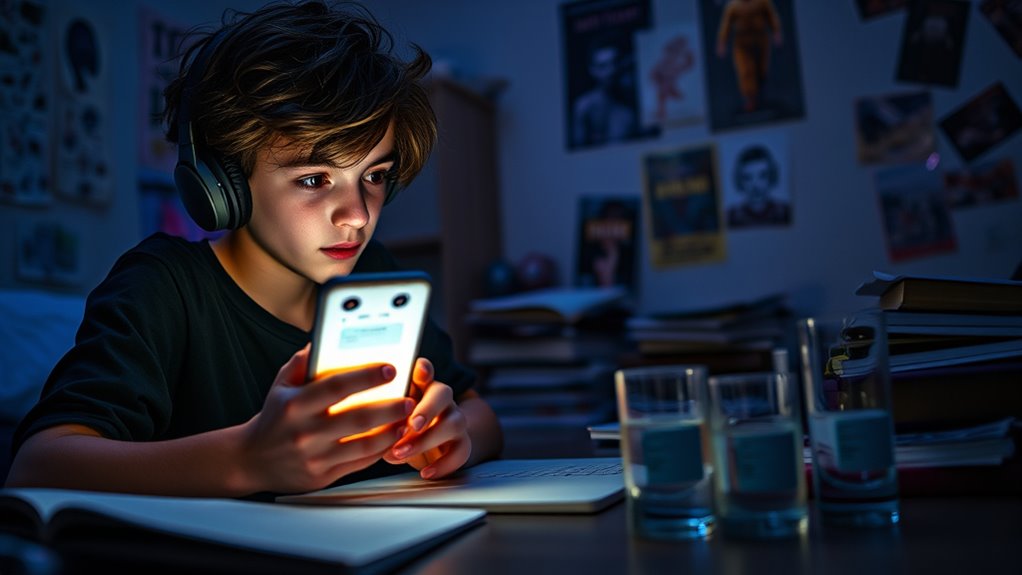As a teen exploring AI chatbots for mental health support, you should be aware that these tools can offer quick, accessible guidance and serve as a helpful supplement. However, privacy concerns about data security and the limits of AI’s empathy may affect your trust and openness. Over-reliance could also hinder your ability to develop real-world coping skills. If you keep exploring, you’ll discover more about balancing AI help with other support systems.
Key Takeaways
- Teens increasingly use AI chatbots for immediate mental health support, supplementing but not replacing professional care.
- Privacy concerns hinder open communication, as sensitive data may be vulnerable to security breaches.
- Over-reliance on chatbots can lead to emotional dependence and hinder the development of real-world coping skills.
- Dependence on AI support may cause teens to avoid seeking help from trusted adults, increasing feelings of isolation.
- Combining AI tools with human support and ensuring data security are essential for safe, effective mental health management.

Have you ever wondered if AI chatbots can effectively support teens struggling with mental health? As more teens turn to these digital tools for guidance, questions about privacy concerns and emotional reliance naturally arise. When you chat with an AI, your conversations are stored and processed to improve the system, but that raises valid worries about how securely your data is protected. Teens might fear that sensitive feelings or personal details could be accessed or misused, making trust a significant barrier. It’s crucial to understand that while many platforms claim to prioritize privacy, no system is entirely foolproof. This uncertainty can make teens hesitant to fully open up, which defeats the purpose of seeking support in the first place.
Privacy concerns can hinder teens from fully opening up to AI chatbots for mental health support.
Another issue is emotional reliance. When teens repeatedly turn to AI chatbots for comfort, advice, or validation, they might start depending heavily on these digital interactions. Unlike human therapists, AI lacks genuine empathy and emotional understanding. While chatbots can recognize certain patterns and respond in supportive ways, they can’t truly grasp the complexity of human emotions or provide the nuanced support a trained therapist offers. Over time, this reliance might prevent teens from developing real-world coping skills or seeking help from actual professionals. Instead, they may become accustomed to the instant gratification of a chatbot’s responses, which can lead to feelings of disappointment or frustration when the AI falls short of their emotional needs.
Furthermore, emotional reliance on AI can make it difficult for teens to differentiate between helpful support and avoidance. Instead of tackling underlying issues or talking to trusted adults, they might prefer the comfort of a chatbot, which can avoid difficult conversations or emotional risks. This dependence can deepen feelings of isolation and hinder their ability to build meaningful relationships outside the digital domain.
While AI chatbots offer a promising supplement to mental health resources, these privacy concerns and potential for emotional reliance highlight the need for balanced use. Teens should be aware of the limitations and risks involved and understand that these tools are just one part of a broader support system. Encouraging open conversations with trusted adults, mental health professionals, or counselors remains essential. Additionally, advancements in AI Security are vital to protect user data and foster trust in these digital tools. Ultimately, AI chatbots can be helpful, but they shouldn’t replace human connection and professional guidance, especially when it comes to vulnerable teens navigating complex emotional landscapes.
Frequently Asked Questions
Are AI Chatbots Legally Licensed Therapists?
AI chatbots aren’t legally licensed therapists because they don’t meet certification standards or legal regulations required for mental health professionals. You should know that licensing involves strict certification standards and oversight by regulatory bodies, which AI systems currently don’t have. While AI chatbots can provide support, they aren’t authorized to replace licensed therapists. Always verify if a mental health tool complies with legal regulations before relying on it for serious issues.
How Do AI Chatbots Handle Crisis Situations?
AI chatbots handle crisis situations by using emotional recognition to assess your mood and detect signs of distress. They offer crisis intervention through immediate, supportive responses, guiding you to calming techniques or encouraging you to seek professional help. While they can’t replace human intervention, their quick emotional recognition allows them to provide timely support, helping you manage urgent feelings until you can access proper mental health resources.
What Data Privacy Measures Protect Teen Users?
Think of your data like a treasure chest, securely locked away. AI chatbots protect your privacy by using data encryption, which shields your information from prying eyes. They also follow strict privacy policies that specify how your data is collected, stored, and used. Always read these policies, so you know your mental health journey stays confidential, and your trust in the technology remains strong.
Can AI Understand and Respond to Complex Emotions?
AI can understand and respond to complex emotions to some extent, thanks to advancements in emotional intelligence and empathy training. You’ll find that chatbots now recognize subtle cues and adapt their responses to show understanding. While they can simulate empathy, they don’t genuinely feel emotions. This means your interactions might feel supportive, but remember, they lack the deep emotional insight a human provides, especially for more nuanced feelings.
Will AI Replace Human Mental Health Professionals?
AI won’t fully replace human mental health professionals because AI empathy is limited. While AI chatbots can offer support, they lack the genuine understanding and emotional depth humans provide. You need to set digital boundaries, knowing AI can assist but can’t replace the nuanced care of a trained therapist. Trust in human professionals remains crucial, especially when complex emotions or mental health crises arise, where empathy and personalized care are essential.
Conclusion
As you explore AI chatbots for teen therapy, remember they’re like a double-edged sword—offering quick support but not a substitute for human connection. While they can be a safety net, relying solely on them might leave emotional gaps unfilled. Think of these bots as a flashlight in a dark room: helpful, but not the entire room illuminated. Use them wisely, and always seek real-world support when needed to truly nurture mental wellness.










